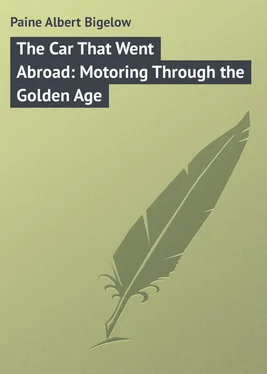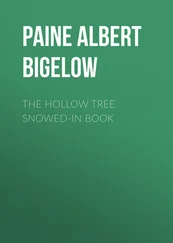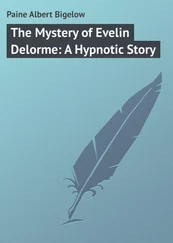Albert Paine - The Car That Went Abroad - Motoring Through the Golden Age
Здесь есть возможность читать онлайн «Albert Paine - The Car That Went Abroad - Motoring Through the Golden Age» — ознакомительный отрывок электронной книги совершенно бесплатно, а после прочтения отрывка купить полную версию. В некоторых случаях можно слушать аудио, скачать через торрент в формате fb2 и присутствует краткое содержание. Жанр: foreign_prose, Путешествия и география, на английском языке. Описание произведения, (предисловие) а так же отзывы посетителей доступны на портале библиотеки ЛибКат.
- Название:The Car That Went Abroad: Motoring Through the Golden Age
- Автор:
- Жанр:
- Год:неизвестен
- ISBN:нет данных
- Рейтинг книги:5 / 5. Голосов: 1
-
Избранное:Добавить в избранное
- Отзывы:
-
Ваша оценка:
- 100
- 1
- 2
- 3
- 4
- 5
The Car That Went Abroad: Motoring Through the Golden Age: краткое содержание, описание и аннотация
Предлагаем к чтению аннотацию, описание, краткое содержание или предисловие (зависит от того, что написал сам автор книги «The Car That Went Abroad: Motoring Through the Golden Age»). Если вы не нашли необходимую информацию о книге — напишите в комментариях, мы постараемся отыскать её.
The Car That Went Abroad: Motoring Through the Golden Age — читать онлайн ознакомительный отрывок
Ниже представлен текст книги, разбитый по страницам. Система сохранения места последней прочитанной страницы, позволяет с удобством читать онлайн бесплатно книгу «The Car That Went Abroad: Motoring Through the Golden Age», без необходимости каждый раз заново искать на чём Вы остановились. Поставьте закладку, и сможете в любой момент перейти на страницу, на которой закончили чтение.
Интервал:
Закладка:
Chapter VIII
GLIMPSES OF THE PAST
Avignon, like Arles, was colonized by the Romans, but the only remains of that time are now in its museum. At Arles the Romans did great things; its heyday was the period of their occupation. Conditions were different at Avignon. Avenio, as they called it, seems to have been a kind of outpost, walled and fortified, but not especially glorified. Very little was going on at Avenio. Christians were seldom burned there. In time a Roman emperor came to Arles, and its people boasted that it was to become the Roman capital. Nothing like that came to Avenio; it would require another thousand years and another Roman occupation to mature its grand destiny.
I do not know just how it worried along during those stormy centuries of waiting, but with plenty of variety, no doubt. I suppose barbarians came like summer leafage, conquered and colonized, mixing the blood of a new race. It became a republic about twelve hundred and something – small, but tough and warlike – commanding the respect of seigneurs and counts, even of kings. Christianity, meantime, had prospered. Avignon had contributed to the Crusades and built churches. Also, a cathedral, though little dreaming that in its sacristy would one day lie the body of a pope.
Avignon's day, however, was even then at hand. Sedition was rife in Italy and the popes, driven from Rome, sought refuge in France. Near Avignon was a small papal dominion of which Carpentras was the capital, and the pope, then Clement V, came often to Avignon. This was honor, but when one day the Bishop of Avignon was made Pope John XXII, and established his seat in his own home, the little city became suddenly what Arles had only hoped to be – the capital of the world.
If one were permitted American parlance at this point, he would say that a boom now set in in Avignon. 7 7 Alphonse Daudet's "La Mule de Pape," in his Lettres de Mon Moulin , gives a delightful picture of Avignon at this period.
Everybody was gay, everybody busy, everybody prosperous. The new pope straightway began to enlarge and embellish his palace, and the community generally followed suit. During the next sixty or seventy years about everything that is to-day of importance was built or rebuilt. New churches were erected, old ones restored. The ancient Roman wall was replaced by the splendid new one. The papal palace was enlarged and strengthened until it became a mighty fortress – one of the grandest structures in Europe. The popes went back to Rome, then, but their legates remained and from their strong citadel administered the affairs of that district for four turbulent centuries. In 1791, Avignon united her fortunes to those of France, and through revolution and bloodshed has come again to freedom and prosperity and peace. I do not know what the population of Avignon was in the day of her greater glory. To-day it is about fifty thousand, and, as it is full to the edges, it was probably not more populous then.
We did not hurry in Avignon. We only loitered about the streets a little the first afternoon, practicing our French on the sellers of postal cards. It was a good place for such practice. If there was a soul in Avignon besides ourselves with a knowledge of English he failed to make himself known. Not even in our hotel was there a manager, porter, or waiter who could muster an English word.
Narcissa and I explored more than the others and discovered the City Hall and a theater and a little open square with a big monument. We also got a distant glimpse of some great towering walls which we knew to be the Palace of the Popes.
Now and again we were assailed by beggars – soiled and persistent small boys who annoyed us a good deal until we concocted an impromptu cure. It was a poem, in French – and effective:
Allez! Allez!
Je n'ai pas de monnaie!
Allez! Allez!
Je n'ai pas de l'argent!
A Frenchman might not have had the courage to mortify his language like that, but we had, and when we marched to that defiant refrain the attacking party fell back.
We left the thoroughfare and wandered down into narrow side streets, cobble-paved and winding, between high, age-stained walls – streets and walls that have surely not been renewed since the great period when the coming of the popes rebuilt Avignon. So many of the houses are apparently of one age and antiquity they might all have sprung up on the same day. What a bustle and building there must have been in those first years after the popes came! Nothing could be too new and fine for the chosen city. Now they are old again, but not always shabby. Many of them, indeed, are of impressive grandeur, with carved casings and ponderous doors. No sign of life about these – no glimpse of luxury, faded or fresh – within. Whatever the life they hold – whatever its past glories or present decline, it is shut away. Only the shabbier homes were open – women at their evening duties, children playing about the stoop. They had nothing to conceal. Tradition, lineage, pride, poverty – they had inherited their share of these things, but they did not seem to be worrying about it. Their affairs were open to inspection; and their habits of dress and occupation caused us to linger, until the narrow streets grew dim and more full of evening echoes, while light began to twinkle in the little basement shops where the ancestors of these people had bought and sold for such a long, long time.
Chapter IX
IN THE CITADEL OF FAITH
We were not very thorough sight-seers. We did not take a guidebook in one hand and a pencil in the other and check the items, thus cleaning up in the fashion of the neat, businesslike tourist. We seldom even had a program. We just wandered out in some general direction, and made a discovery or two, looked it over, surmised about it and passed judgment on its artistic and historical importance, just as if we knew something of those things; then when we got to a quiet place we took out the book and looked up what we had seen, and quite often, with the book's assistance, reversed our judgments and went back and got an altogether new set of impressions, and kept whichever we liked best. It was a loose system, to be recommended only for its variety. At the church of St. Agricole, for instance, which we happened upon when we started out one morning, we had a most interesting half hour discussing the age and beauty of its crumbling exterior and wandering about in its dimness, speculating concerning its frescoes and stained marbles and ancient tombs. When, later, we sat on the steps outside and looked it up and found it had been established away back in 680, and twice since restored; that the fifteenth-century holy-water basin was an especially fine one; that the tombs and altar piece, the sculpture and frescoes were regarded as "remarkable examples," we were deeply impressed and went back to verify these things. Then we could see that it was all just as the book said.
But the procedure was somewhat different at the Palace of the Popes. We knew where we were going then, for we saw its towers looming against the sky, and no one could mistake that pile in Avignon. Furthermore, we paid a small fee at its massive arched entrance, and there was a guardian, or guide, to show us through. It is true he spoke only French – Provençal French – but two gracious Italian ladies happened to be going through at the same time and, like all cultured continentals, they spoke a variety of tongues, including American. The touch of travel makes the whole world kin, and they threw out a line when they saw us floundering, and towed us through. It was a gentle courtesy which we accepted with thankful hearts.
We were in the central court first, the dull, sinister walls towering on every side. The guide said that executions had taken place there, and once, in later times – the period of the Revolution – a massacre in which seventy perished. He also mentioned a bishop of the earlier period who, having fallen into disfavor, was skinned alive and burned just outside the palace entrance. Think of doing that to a bishop!
Читать дальшеИнтервал:
Закладка:
Похожие книги на «The Car That Went Abroad: Motoring Through the Golden Age»
Представляем Вашему вниманию похожие книги на «The Car That Went Abroad: Motoring Through the Golden Age» списком для выбора. Мы отобрали схожую по названию и смыслу литературу в надежде предоставить читателям больше вариантов отыскать новые, интересные, ещё непрочитанные произведения.
Обсуждение, отзывы о книге «The Car That Went Abroad: Motoring Through the Golden Age» и просто собственные мнения читателей. Оставьте ваши комментарии, напишите, что Вы думаете о произведении, его смысле или главных героях. Укажите что конкретно понравилось, а что нет, и почему Вы так считаете.












